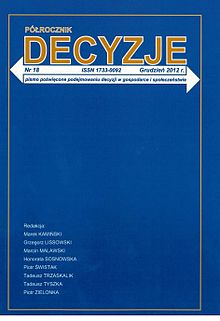Schelling games, Kuran dominos and electoral coalitions. Non-standard game-theoretic models of collective action
Schelling games, Kuran dominos and electoral coalitions. Non-standard game-theoretic models of collective action
Author(s): Marek M, KamińskiSubject(s): Social Sciences, Economy
Published by: Akademia Leona Koźmińskiego
Keywords: collective action; non-cooperative games; partition function; Schelling’s games; Kuran’s games; Mancur Olson
Summary/Abstract: Non-cooperative games such as the Prisoner’s Dilemma, Stag Hunt, Asymmetric Coordination and others are primary tools used for modeling collective action. I consider formal models that are close cousins of such standard games: Schelling’s games, Kuran’s dominos and partition function form games. For certain empirical problems, each of these formalisms may have advantages over standard games. Among the benefi ts there are mathematical simplicity, more intuitive depiction of represented phenomena, and better operationalizability.I formalize all three models and prove simple existence theorems for two of them. The detailed examples of applications include vaccination, unpredictability of revolutions, and electoral coalitions.
Journal: Decyzje
- Issue Year: 2015
- Issue No: 24
- Page Range: 91-105
- Page Count: 15
- Language: English

